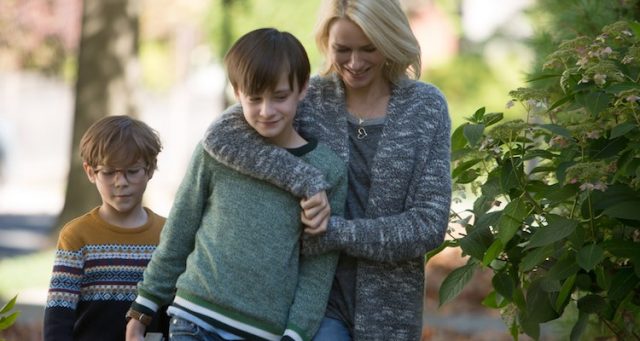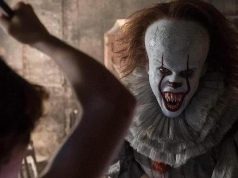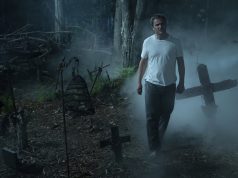
“The Book of Henry” is such a mushy, misguided disaster that even its irrelevant subplots are inexplicable. The baffling wrong-headedness permeates every scene in such a way that you’d swear it was done on purpose.
Directed with Hallmark-movie superficiality by Colin Trevorrow (“Jurassic World”) from a phony-sweet screenplay by novelist Gregg Hurwitz, it’s about a precocious 11-year-old genius named Henry Carpenter (Jaeden Lieberher). He’s the sort of quirky movie kid who constantly scribbles in a notebook and who does the family’s finances while his somewhat flighty mother, Susan (Naomi Watts), plays video games.
(Henry also has a little brother, Peter, played by Jacob Tremblay, but he doesn’t matter.)
Susan works as a diner waitress even though she’s independently wealthy, which Henry keeps pointing out makes the job unnecessary. She actively keeps her affluence a secret from her co-worker, Sheila (Sarah Silverman), who’s also more or less her best friend. Why Susan has the job (which she isn’t very good at) is never explained, nor is her secrecy, nor does any of it serve any purpose in the story.
But that’s not what the movie’s about. The movie’s about Henry’s discovery that Christina (Maddie Ziegler), the quiet girl next door, is being abused by her stepfather, Glenn (Dean Norris). Trevorrow goes out of his way not to show or describe what the “abuse” is — he wants it to be a plot point without being a bummer — but the mature viewer will understand that Glenn is raping his stepdaughter. Henry learns this horrific fact when Glenn enters the girl’s room one evening to commit his nightly rape and doesn’t close the curtains or notice there’s a boy watching him from the window of the house next door.
Despite being an eyewitness (apparently — the movie doesn’t show us what he sees), Henry can’t get anyone to take action to help Christina. A call to Child Protective Services is a bust: Glenn is the police commissioner, and wouldn’t you know it, the guy in charge of CPS is his brother!
[Non-spoiler review ending.]
The story’s most distasteful elements fall under the “spoiler” category; suffice it to say that brain tumors, emotional manipulation, logistically impossible schemes, and nonsensical character choices are all involved. The movie brings up ghastly subjects but refuses to address them realistically, lest the whimsical mood be ruined. This is twee, simple-minded button-pushing for dummies.
[SPOILER REVIEW ENDING. This movie is crazy, and you deserve to know the whole plot.]
About halfway through the film, Henry gets a brain tumor and dies. (Re-read that sentence if you want to, but yes.) He has enough time between diagnosis and death — maybe a week — to finish his notebook. Little brother Peter finds it, reads it, and has this conversation with Susan:
PETER: Mom, I think Henry wants us to kill Glenn!
SUSAN: (correcting him) Mr. Sickleman.
Seems Henry formulated a thorough plan to kill Glenn and get away with it. He found a disreputable gun shop that would sell illegal weapons and untraceable bullets. (He found it by happening to sneak in to the shop when a lowlife happened to be there making the under-the-counter negotiations.) He devised a way to lure Glenn into the woods near their home, and plotted a hiding place from which Susan (or whoever) could safely shoot him in the head.
Now, at first, Susan is not having it. “We are not murdering the police commissioner and that’s final,” she tells Peter. But then she, too, witnesses the abuse — Glenn never thinks to close those curtains before raping his stepdaughter — and now she is onboard.
Fortunately, Henry left cassette tapes with detailed, minute-by-minute instructions for the entire affair — including the part, before the killing, where Susan tricks Glenn into signing a document giving her custody of Christina if anything should ever happen to him. These cassettes are SO detailed that when Susan is in her sniper position with Glenn in the crosshairs, Henry is on the tape saying, “Mom! Take the shot! Do it now!” (There we have an example of a movie taking an inherently stupid plot and making it worse by executing it stupidly.)
Susan does not kill Glenn, however, as she remembers at the last second that Henry was a child and children often have bad ideas. Instead, she confronts Glenn, who becomes convinced that the jig is up and commits suicide. Christina joins Susan and Peter’s family and they all live happily ever after, I guess.
The only way I can imagine this movie working is if it were treated as a pitch-black comedy. (Those bits of dialogue I quoted are the only instances of self-aware humor.) But Trevorrow is bent on making it aggressively whimsical, with saccharine interludes like Susan singing a bedtime song while accompanying herself on the ukulele, or a school talent show where Peter pays tribute to his dead brother with a magic trick. And at its core, the film is centered on heinous acts that it refuses to treat seriously, a cavalier misuse of tragedy. This is twee, simple-minded button-pushing for dummies.
D (1 hr., 45 min.; )





